Goodell Family
“O, how I’d love to have you with me, dear sis, that I could have some confidante; other girls have their sister or somebody; you know there are but few who can fill that place.”
Lavinia Goodell, January 18, 1862
Throughout her life, Lavinia was very devoted to her family. She exchanged chatty letters with them, shared confidences, and offered and received support in trying times. Here are thumbnail sketches of the people in her inner circle.
William Goodell (1792-1878)

Lavinia’s father was born in Coventry, New York. He was a descendant of Robert Goodell, an immigrant from Ipswich, England, who arrived in Massachusetts in 1634. As a young man William served as super-cargo on a ship bound for the East Indies, China, and the European markets. Upon his return he engaged in business in a number of locations, including Wilmington, North Carolina, and Alexandria, Virginia, where he saw the slave trade in action. He “grew restive over his day book and ledger…. What to him were the daily balancing of profit and loss over paltry bales of cotton, when slavery was creeping steadily onward, threatening to enchain the nation.” (1) He became an ardent abolitionist and wrote frequently for various periodicals on the religious, moral, and political issues of the day.
William married Clarissa Cady in 1823. Their first daughter died in infancy. Their second daughter, Clarissa Maria Goodell, was born in 1827, and their third daughter, Rhoda Lavinia Goodell, was born in 1839.
Prior to the Civil War, even in the North, the anti-slavery sentiment was often viewed as incendiary. “Abolitionists were persecuted, mobbed, their lives threatened, and their names cast out as evil.” While living in Brooklyn in the 1830s, William and his family were forced to flee their home “till the fury of the mob-oligarchy had spent itself.” (1)
William edited a series of temperance and anti-slavery newspapers, including The Emancipator, The Friend of Man, The Radical Abolitionist, and The Principia. His many other writings include Slavery and Anti-Slavery. According to his daughters:
He took a sympathetic personal interest in the humblest being who needed his help. His home was not only open to the intellectual, the cultural, and the philanthropic, but to the ragged fugitive slave hiding from his pursuers; or the robbed and bewildered traveler without money, friends or credit. The outcast, the suffering, even the sinning, but repentant found a friend in him.(1)
Along with two other men, William Goodell met with President Abraham Lincoln the night before the Emancipation Proclamation was signed and “afterwards had the satisfaction of seeing some of his own expressions embodied in the Proclamation, which was issued the next day at noon.”(1)
William was strongly in favor of woman’s suffrage. Though he was never ordained, he founded a church in Honeoye, New York in 1842, based on the principles of emancipation, prohibition, and church reform, and he was among those who organized the American Missionary Society and the National Prohibition Party.
In 1870, he and his wife moved to Janesville, Wisconsin, then the home of their elder daughter, Maria Goodell Frost, and her family. Lavinia joined her parents in Janesville in the fall of 1871 when the Frosts relocated. William was supportive of Lavinia’s legal aspirations, and he and Lavinia were both very active in temperance causes while they lived in Wisconsin.
Clarissa Cady Goodell (1797-1878)
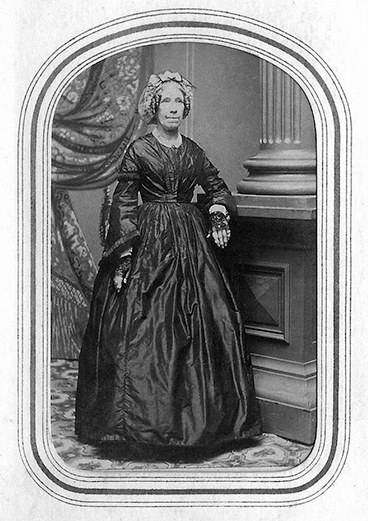
Lavinia’s mother was born in Connecticut. She was a cousin of Elizabeth Cady Stanton through their fourth great-grandfather. Clarissa was much more conservative than her husband, but at the time of Lavinia’s birth she was a member of the Female Moral Reform Society, which stressed work as a “safeguard to woman” so they would not feel their “utter dependence on man.”(6) After the end of the Civil War and the shuttering of The Principia, William and Clarissa lived with her sister’s family, the Thomases, in Connecticut. The Goodells’ move to Janesville, Wisconsin, in 1870 was made possible in part by a sizable inheritance Clarissa had received from her brother Isaac Cady, a successful book publisher. Clarissa never fully embraced Lavinia’s decision to pursue legal studies. A week before Lavinia was admitted to the bar in Rock County, Wisconsin, Clarissa lamented in a letter to Maria, “I was very sorry Lavinia goes to the lawyer’s office every day.”(4) Clarissa’s mental health deteriorated throughout the 1870s, and in 1877 she was placed in the Wisconsin State Hospital for the Insane (now Mendota Health Institute). She died there in 1878, two months after her husband’s death.
Maria Goodell Frost (1826-1899)
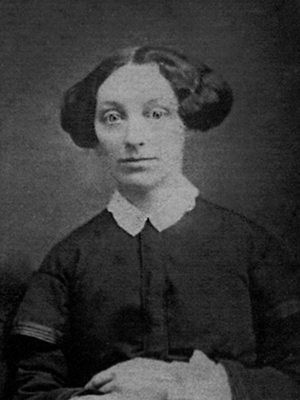
Lavinia’s sister was born in Providence, Rhode Island. Twelve years Lavinia’s senior, Maria attended Oberlin College, where she met Lewis P. Frost. She married Lewis when Lavinia was twelve years old. For the rest of Lavinia’s life the siblings maintained a weekly correspondence. Lavinia entrusted her sister with personal thoughts and aspirations that she feared might upset their mother. It was to Maria that Lavinia confided in 1858, “I think the study of law would be pleasant, but the practice attended with many embarrassments. Indeed I fear it would be utterly impracticable.”(8) When Lavinia did embark on her legal studies in the mid 1870s, Maria was generally supportive but expressed some concern that entering the legal profession would require Lavinia to have close dealings with men. Lavinia set her straight. “You speak as if it would be dreadful to ‘encounter men alone.’ I don’t think it is when you are not tied to them for life, but are free and independent and can get away from them again if they are disagreeable.”(2) When Lavinia started teaching classes at the Rock County jail, Maria was alarmed that her sister was fraternizing with criminals. Lavinia’s answer was blunt: “Am no more afraid of those boys than I am of you.”
Maria was a strong advocate for woman’s suffrage and wrote an essay titled “Ten Reasons Why Women Should Vote.” Maria and her husband, who was a pastor, had six children. A son died in infancy, and a daughter, Hattie, died in childhood. Four sons lived to adulthood. Maria began to lose her hearing as a young woman and in her later years was completely deaf. The Frosts’ marriage was not always a happy one, and the couple divorced in 1882.
Lewis P. Frost (1821-1893)
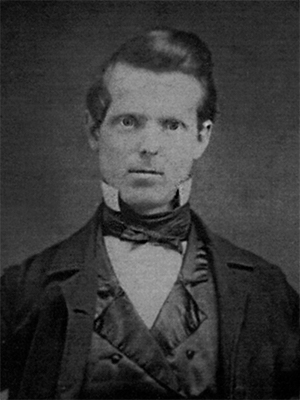
Lavinia’s brother-in-law was a native of New York and graduated from Oberlin College in 1848. Following his marriage to Maria Goodell, he was for many years the pastor of small village churches in New York, Wisconsin, and Michigan. His family owned a farm south of Janesville, Wisconsin, near the Blind Institute. The Goodells’ relationship with Lewis was somewhat strained at times, and he felt the family did not appreciate him. There was no doubt a grain of truth in his suspicion. Before Lavinia’s short story “A Psychological Experiment,” featuring a self-centered and distant husband, was published in Harper’s magazine, Clarissa Goodell expressed concern that readers might notice the character’s similarity to Lewis. She wrote Lavinia, “I suppose you had to give your real name to the publishers. I hope you have not said anything very bad in representing a certain character because the people in this family will all know about it.”(5) Lewis and Maria divorced in 1882. Lewis remarried and entered the milk business.
William Goodell Frost (1854-1938)
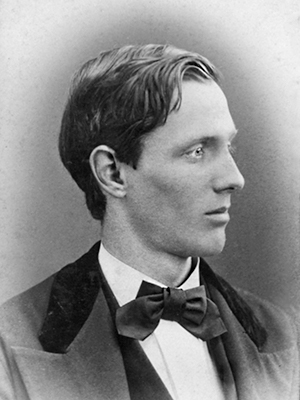
Lavinia clearly doted on Maria and Lewis’s eldest son and affectionately referred to him as “Willie.” He was an 1876 Oberlin graduate and was a professor of Greek at Oberlin from his graduation until 1892 when he became the president of Berea College in Berea, Kentucky. He served in that role until 1920. It was he who donated the Goodell family papers to Berea’s library. William Goodell Frost was an ordained Congregationalist minister. He was strongly pro-temperance but not so keen on the question of woman’s suffrage. In 1887 he angrily wrote to his mother, “You pulled the trumpet out of your ear so as to prevent me from finishing what I tried to say…. You know that I am in favor of repealing every law which can be shown to discriminate against women, and that I shall desire them to vote whenever it will be for their good or the good of anybody else.”(10)
Lewis Clayton Frost (1859-1922)
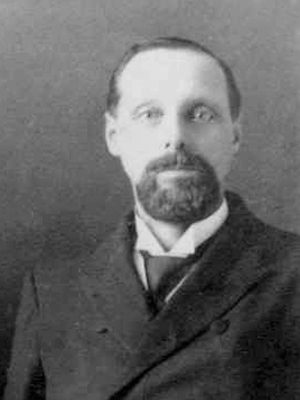
Maria and Lewis Frost’s second son. “Clatie,” as Lavinia called him, was a Methodist preacher.
Nelson Amasa Frost (1866-1931)
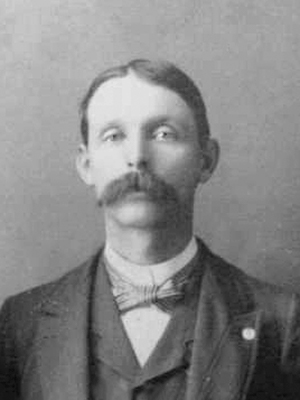
Maria and Lewis Frost’s third son. Lavinia sometimes referred to him as “Nellie.” He was a school superintendent in the state of Oregon.
Willard Jerome Frost (1869-1956)
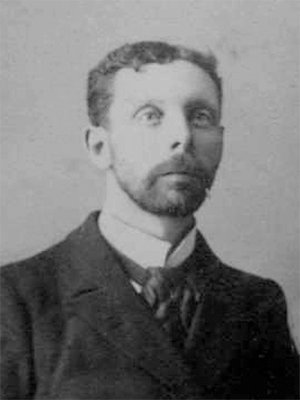
Maria and Lewis’s youngest son was a Presbyterian minister.
Sarah Thomas (1840-1900)
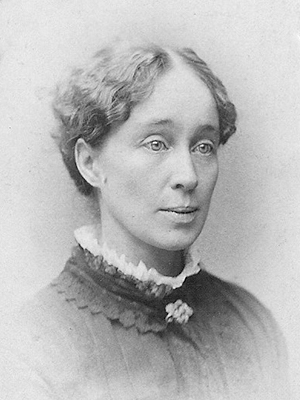
The daughter of Mary Cady (Clarissa Goodell’s sister) and Peleg Thomas, Lavinia’s cousin was born in Connecticut and spent most of her life there. Lavinia and Sarah were each other’s closest confidantes. When Lavinia gave up her job at Harper’s Bazar to move to Janesville in 1871 in order to care for her aging parents, she persuaded the Harper brothers to hire Sarah as her replacement. In 1876, when Clarissa Goodell’s mental state was rapidly deteriorating, Sarah came to Janesville to help Lavinia care for her. Sarah also helped care for Lavinia following her ovarian cancer surgery in 1878 and was present when Lavinia died in Milwaukee in March of 1880.
Sarah and Lavinia exchanged long and juicy weekly letters, almost like clockwork, throughout their adult lives. While Lavinia could be a bit circumspect in letters to most of her other correspondents, including Maria, her writings to Sarah held nothing back. Lavinia’s epistles to her cousin give some of the best glimpses into Lavinia’s personality. They are by turns witty, contemplative, and scathing. For example, when Lavinia renewed her application for admission to the Wisconsin Supreme Court in 1879, she wrote to Sarah:
I expect to devote next week preparing a dose for [Chief Justice] Ryan calculated either to kill or cure. There are now five judges on the bench (formerly just three) so it is quite probable there will be a disagreement among them and a dissenting opinion one way or the other. So much the better. It will agitate the subject and advertise me and if they don’t admit me I shall “go for” them in the U.S. Supreme Court & then we’ll see! (3)
And in December of 1879, after Lavinia had abruptly moved to Madison, Wisconsin, and found herself with few friends, limited business prospects and in rapidly declining health, she bitterly complained to Sarah:
I never saw a set of people who were such contemptable moral cowards – men and women both – as they are here. I despise them all; and consider myself a missionary among Hottentots. (11)
Sources consulted: (1) In Memoriam: William Goodell (Chicago, Gilbert & Winchell, 1879); (2) Lavinia Goodell letters to Maria Frost (January 18, 1862, October 8, 1874); (3) Lavini a Goodell letter to Sarah Thomas (March 29, 1879); (4) Clarissa Goodell letter to Maria Frost (June 11, 1874); (5) Clarissa Goodell letter to Lavinia Goodell (April 21, 1866); (6) Catherine B. Cleary, “Lavinia Goodell, First Woman Lawyer in Wisconsin,” Wisconsin Magazine of History 74, No. 4 (Summer 1991); (7) Matter of Guardianship of Clarissa C. Goodell, Rock County, Wisconsin Court; (8) Maria Goodell Frost, “Life of Lavinia Goodell” at 40 (unpublished manuscript); (9) Janesville Daily Gazette, February 22, 1893; (10) William Goodell Frost Letter to Maria Frost (October 16, 1878); (11) Lavinia Goodell letter to Sarah Thomas (December 17. 1879).
Photo credits: William and Clarissa Goodell, Sarah Thomas (private collection of Beverly Wright); Maria Goodell Frost, Lewis Frost, and William Goodell Frost (William Goodell Family Collection, 1780-1892, located in the Special Collections and Archives at Berea College); Lewis Clayton Frost, Nelson Amasa Frost, and Willard Jerome Frost (private collection of Lynn Frost Goodell).